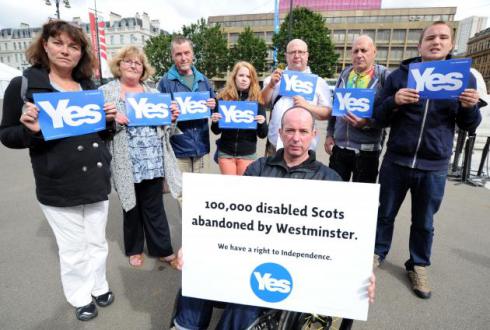The independence referendum campaign gave so many people a glimpse that another Scotland is possible – we must continue to strive for this and not allow disabled Scots to become invisible collateral damage.
 In a week where it was announced that thousands of people with degenerative conditions were being classified as ‘fit to work in future’ – despite no possibility of improvement – and in which Lord Freud, a minister in the UK’s Department of Work and Pensions, declared that disabled people are “not worth the full wage” – Jamie Szymkowiak writes on austerity, welfare and disability.My disability is arthrogryposis multiplex congenita – which to you and I means permanent stiffness in the joints. Like every disability, the degree in which it impacts on my life differs from someone who may have the same condition. Spiral staircases, cobbled streets and reaching my own right foot are my everyday nemesis but for other people it may be filling out an application form, preparing their breakfast, going to the bathroom unaided or leaving their own home.During the referendum campaign, people with disabilities became a homogeneous group often spoken about in the quest for social justice yet themselves received little media exposure; an issue that faced the group “Disabled People 4 Yes” – ironically due to the lack of a No equivalent and the BBC’s apparent need for neutrality. It was for this reason, I felt compelled to climb the stairs in the tenements of Craigmillar and pound the crazy paving that line the lawns of Trinity for a Scotland away from Westminster austerity for those who, like my youngest brother who has Downs Syndrome, could not.Alas, the majority of voters opted for the Union thus leaving some of the most vulnerable in our society facing a Government which includes a welfare minister who suggests that workers with disabilities are not worth the minimum wage or an Opposition that fails to offer an alternative vision to Austerity Britain.Over the last few years, people with disabilities have faced the implementation of the Employment Support Allowance (ESA), the replacement of Disability Living Allowance (DLA) by Personal Independence Payment (PIP) as well as housing benefit cuts such as the “bedroom tax.”
In a week where it was announced that thousands of people with degenerative conditions were being classified as ‘fit to work in future’ – despite no possibility of improvement – and in which Lord Freud, a minister in the UK’s Department of Work and Pensions, declared that disabled people are “not worth the full wage” – Jamie Szymkowiak writes on austerity, welfare and disability.My disability is arthrogryposis multiplex congenita – which to you and I means permanent stiffness in the joints. Like every disability, the degree in which it impacts on my life differs from someone who may have the same condition. Spiral staircases, cobbled streets and reaching my own right foot are my everyday nemesis but for other people it may be filling out an application form, preparing their breakfast, going to the bathroom unaided or leaving their own home.During the referendum campaign, people with disabilities became a homogeneous group often spoken about in the quest for social justice yet themselves received little media exposure; an issue that faced the group “Disabled People 4 Yes” – ironically due to the lack of a No equivalent and the BBC’s apparent need for neutrality. It was for this reason, I felt compelled to climb the stairs in the tenements of Craigmillar and pound the crazy paving that line the lawns of Trinity for a Scotland away from Westminster austerity for those who, like my youngest brother who has Downs Syndrome, could not.Alas, the majority of voters opted for the Union thus leaving some of the most vulnerable in our society facing a Government which includes a welfare minister who suggests that workers with disabilities are not worth the minimum wage or an Opposition that fails to offer an alternative vision to Austerity Britain.Over the last few years, people with disabilities have faced the implementation of the Employment Support Allowance (ESA), the replacement of Disability Living Allowance (DLA) by Personal Independence Payment (PIP) as well as housing benefit cuts such as the “bedroom tax.”
The awful impact of the degrading Work Capability Assessments has been well documented but the rumoured replacement of ATOS by American private firm MAXIMUS has heightened concerns even further and led disabled rights activist John McArdle of the Black Triangle Campaign to describe it is “a simple case of out of the frying pan and into the fire.” Whoever the contractor is, you simply cannot get away from the fact that any form of tick-box assessment by non-medical professionals is ludicrous, demeaning and causes more work via numerous appeals that only increases the stress and uncertainty of the person seeking support.
Most people accept that welfare reform is needed but surely this can be achieved in a dignified and uncomplicated manner that creates a benefits system to support those most in need?
On this, Susie Fitton, Senior Policy Adviser for Capability Scotland, says . . .
Please continue reading at Bella Caledonia:


1 thought on “Disabled Scots: Invisible Collateral Damage”